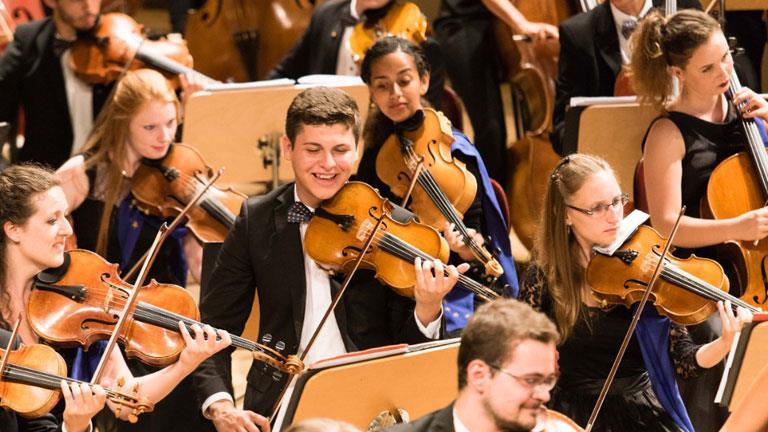Media coverage of the looming Brexit exodus from London has focussed on the departure of banking jobs and the European Union’s medicine and banking agencies but another loss that has got less attention is the EU Youth Orchestra, which is also about to pack its bags for the Continent.
 One of the world’s greatest training orchestras, the EUYO has been based in London for 40 years and uses EU funds to engage 120 players aged between 17 and 24 each year, with 13 of the current musicians being from Britain.
One of the world’s greatest training orchestras, the EUYO has been based in London for 40 years and uses EU funds to engage 120 players aged between 17 and 24 each year, with 13 of the current musicians being from Britain.
It is a “sad fact of life” that London is about to lose the orchestra to Italy and young British talent will lose the chance to take part in the orchestra, its chief executive Marshall Marcus told Felix Magazine. Italy, Belgium and Austria leapt on the chance to poach the prestigious orchestra’s operations.
Leading British orchestras are particularly fearful of what Brexit might mean for classical music in the UK, as public and private funding are expected to fall and British musicians have featured strongly among the 3,000 musicians who have passed through the EUYO to win positions at the world’s leading orchestras.
Apart from the loss of strong EU funding for classical music the industry expects a sharp decline in private funding, as the financial institutions and wealthy financiers who are now considering moving many jobs away from the UK are among London’s biggest donors and supporters of the arts.
Musicians Worried
 Orchestras are also worried about the future opportunities and rights of British musicians in Europe and the visa status of European musicians in the UK. If it becomes more difficult for artists to work in different countries and even more expensive to transport instruments across borders British musicians are likely to find themselves more isolated from the mainstream of classical music in Europe.
Orchestras are also worried about the future opportunities and rights of British musicians in Europe and the visa status of European musicians in the UK. If it becomes more difficult for artists to work in different countries and even more expensive to transport instruments across borders British musicians are likely to find themselves more isolated from the mainstream of classical music in Europe.
“There is a whole gamut of things for UK organisations, which means going out of the UK into the EU is going to become more complicated and more expensive,” Marcus said. “The classical music industry operates with very slim margins. These things can be a bit of a killer.”
Brexit would not stop the EUYO coming to the Proms or the Edinburgh international festival but there would be question marks over other projects.
Marcus said Brexit supporters – who an average are considerably older than “Remain” supporters – seemed to have given little thought to the fact that Brexit would deprive young Britons of many cultural and educational opportunities.
“The orchestra is just one and I can think that the Erasmus Plus programme is another,” he said, referring to the EU program that allows thousands of British students to study in the EU each year.
“I don’t know if people are aware that over the seven years of the ‘Creative Europe’ programme funding from the EU for culture and new media alone has benefitted Britain to the tune of 1.45b Euros,” he said. “And accessing that sort of money, that will be lost.”
Going Solo
 The prestigious orchestra, which has worked with some of the world’s most famous conductors, has provided players for most leading orchestras. “It has been quite an extraordinary conduit for talent, British and European, who have passed into almost every major orchestra in the world,” Marcus said. “There are alumni playing everywhere.”
The prestigious orchestra, which has worked with some of the world’s most famous conductors, has provided players for most leading orchestras. “It has been quite an extraordinary conduit for talent, British and European, who have passed into almost every major orchestra in the world,” Marcus said. “There are alumni playing everywhere.”
The orchestra will move from London next year to new headquarters in Italy and will develop a base in southern Austria and an office in Brussels following an invitation from the Brussels Philharmonic, which swooped on the chance to be engaged with a youth orchestra that is such a steady source of talent.
”The fact is we cannot be an EU orchestra and invite one country (Britain) from outside the EU to be part of the organisation,” said Marcus.
“What it means is the EUYO will make it available to British young player to take part in the orchestra in 2018 and 2019. From then onwards it depends on what transitional arrangements are and then what the (Brexit) settlement is.”
The orchestra’s co-chairs, Sir John Tusa and Ian Stoutzker, said they were delighted with the orchestra’s agreement with the Italian Government and the city of Ferrara. “This is a major endorsement of the achievements and potential of the EUYO as practical evidence of Europe in action,” they said.
by Bob Graham
The post Brexit: Classical Music Suffers UK Exodus appeared first on Felix Magazine.
No comments:
Post a Comment